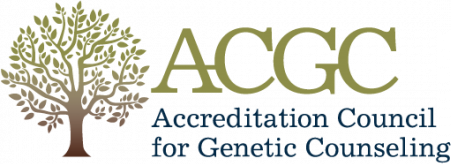
FAQs
ACGC developed this resource to help provide answers about key areas of the Standards changes to note. You can also download the Revised Standards FAQs in PDF format.
All information on this page is updated as of September 2023.
Standards Revision - Frequently Asked Questions
Diversity: the representation of shared and distinct personal and group characteristics and identities and how they may intersect, including, but not limited to, race, ethnicity, national origin, age, religion, disability, veteran status, sex, sexual orientation, gender identity/ expression, pregnancy, genetic information, socioeconomic class, geographic location, and socioeconomic background. Additionally, diversity may also include characteristics that describe genetic counseling programs, such as location of the academic institution,
institution type (private, public, other), and methods of delivering didactic, clinical, and research components of genetic counseling training.
Equity: fair accessibility to, and opportunities for advancement within, a community or organization, regardless of shared or distinct personal and group characteristics and identities. Equity should guide the continuous activities of genetic counseling education access and delivery, including, but not limited to, identifying and eliminating barriers to full participation
in genetic counseling training programs, creating and reviewing standards for genetic counseling education, and evaluating genetic counseling programs to foster an environment that is supportive of faculty, staff, and students.
Inclusion: intentionally inviting, welcoming, and engaging all members of diverse communities, including staff, volunteers, students, and community members, to contribute and fully participate in all aspects of organizational work including, for example, program evaluation and management.
Justice: The deliberate creation of diverse and equitable opportunities, and the continued reassessment and dismantling of barriers and systems that prevent access to such opportunities. Striving towards justice requires active work to address differentials in power and privilege, including provision of information and standards for program operations.
Section A
A1.1.1, A1.1.2, A1.1.4, and A1.3.1
A2.1.1, A2.2.2, A2.2.3, A2.3.1, A2.4.1, A2.5, A2.5.1, A2.5.2, A2.5.3, A2.6.1, and A2.6.2 A3.1.1, A3.1.2, A3.2.2 a & b, A3.2.2 c, A3.2.3, and A3.2.4
Section B
B1.6
B2.1.1, B2.1.2, B2.1.3, B2.1.3 e, B2.1.4, B2.1.5, B2.1.6, B2.1.7, B2.1.8, and B2.1.9 B3.6.1
B4
Section C
C1.4
C2.1, C2.2, and C2.3.1
C3.1, C3.1.2, and C3.2.5
The ACGC Diversity Taskforce was convened in the winter of 2019 with the goal of outlining recommendations for updates to the existing ACGC Standards for Accreditation related to the topics of diversity, equity, inclusion, and justice. These recommendations were provided to the ACGC Board of Directors in the summer of 2021. In 2022, the ACGC Standards Committee was charged with incorporating the Diversity Taskforce recommendations into the existing standards as well as reviewing the standards for inclusive language. These recommendations were circulated for public comment in December 2022 and the revisions were finalized in summer 2023. The ACGC Diversity, Equity, Inclusion, and Justice Committee was convened in 2022 and were consulted by the Standards Committee as the public comment was incorporated into the revisions.
The ACGC Board of Directors requested that the Standards Committee revise two standards off-cycle as follows:
a. A1.1: The ACGC Board of Directors requested that “regional accrediting organization” be changed to “institutional accrediting organization” to mirror the language used by the United States Department of Education. The United States Department of Education refers to those agencies as institutional accrediting agencies, not regional accrediting agencies, and many of the “regionals” are now accrediting institutions outside of their traditional geographic region.
b. A4.1: The ACGC Board of Directors requested revision of this standard because the leadership FTE amounts overlap between categories. The revision defines the minimum amount of leadership FTE based upon the number of students. At the next full review, the Standards committee will assess whether the minimum amount of leadership FTE should be adjusted.
The next full revision will begin in 2024 and historically has taken 24 months to complete. This process includes input from the ACGC Board of Directors, identification and survey of community partners, and a public comment period.
Compliance
Standards
At time of application: All Candidacy and New Program applications accepted by ACGC must be in compliance with the August 2023 Standards.
August 1, 2024: All Accredited Programs must be in compliance with the August 2023 Standards by August 1, 2024.
Practice-Based Competencies
Applications accepted in 2024: Candidacy and New Program applications accepted by ACGC as of January 1, 2024, must be in compliance with the August 2023 Practice Based Competencies.
June 15, 2025: All Accredited Programs must be in compliance with the August 2023 ACGC Practice Based Competencies by June 15, 2025.
Terminology
This means incorporating DEIJ principles when developing and delivering every aspect of a program from recruitment and admissions to curriculum, clinical training, and research. Some examples include having diverse staff and students, creating opportunities to learn about DEIJ topics, practicing cultural humility, protecting and amplifying the needs and voices of individu- als in vulnerable positions, and prioritizing self-reflection. Incorporating DEIJ should not entail a single event, lecture, course, etc., though these are examples of ways to incorporate these principles within a program’s structure. The Association of American Medical Colleges pro- vides a description of what equity-mindedness looks like in academic medicine here.
ACGC defines underrepresented in genetic counseling as all individuals with characteristics and identities that are not equitably included or represented in the profession, with consider- ation for the demographics of the communities we serve. These characteristics include, but are not limited to age, race, ethnicity, sex, gender, sexual orientation, socioeconomic status, country of origin, culture, language, religion, spiritual beliefs, legal status, health history, and disability.
The terms professional and professionalism were removed from the Standards due to the Eurocentric history of these words and their use in medical, educational, and workplace environments to perpetuate discrimination against historically excluded groups. In place of the words professional or professionalism, we encourage the description of specific expectations and/or criteria.
The following resources were used to identify terminology throughout the Standards in an effort to use language that is reflective of health equity.
- A guide from the American Medical Association’s Center for Health Equity and the Association of American Medical College’s Center for Health Justice entitled, “Advancing Health Equity: A Guide to Language, Narrative, and Concepts”.
- The Center for Disease Control’s health equity guiding principles for inclusive communication.
Section A
The Standards Committee determined best practices for genetic counseling training programs. Minimum requirements were set forth for ongoing training/coursework related to roles and responsibilities within the program, encompassing DEIJ training.
- Individuals are encouraged to engage in a variety of activities related to DEIJ, which could include but are not limited to:
- Lectures, seminars, webinars, and related talks
- Workshops, retreats, and focus groups
- Can be found through resources such as:
- Employer or school-sponsored programs (either in person or online)
- Professional organizations, such as: NSGC’s resources: https://www.nsgc.org/Pol- icy-Research-and-Publications/Justice-Equity-Diversity-and-Inclusion-JEDI/DEI-Re- sources and AMA’s online classes for DEIJ: https://www.amanet.org/training-topics/ diversity-and-inclusion/
- JOGC CEU articles, books, podcasts,
- Tied to CEUS,
- Committee, advisory board, task force, community engagement
All programs are required to be in compliance with federal, state, and provincial laws regarding student privacy, accessibility, and non-discrimination. It is encouraged to consult with your university’s office for disability/accessibility services for applicable federal, provincial, and state legislation. Some examples include (but are not limited to): FERPA (Family Educational Rights and Privacy Act), The Accessible Canada Act, Title IX, and the Americans with Disabilities Act.
Success with respect to student achievement is at the heart of accreditation. In the interest of transparency, accrediting agencies that are recognized or are seeking such recognition (which ACGC is working towards) by the Council on Higher Education Accreditation (www. chea.org) are required to have the institutions and programs they accredit make available to the public evidence of student success, including board pass rates, attrition rates, and job placement rates.
All programs should format this data in the following way: “For the three most recent graduating classes (Year – Year), the [insert Name of Graduate Program] has a [insert % (n of first –time test takers who passed/number of first-time test takers) first-time pass rate on the American Board of Genetic Counseling’s Certification Examination.”
It should be noted that programs are also able to and encouraged to publish their overall ABGC Board Pass Rate.
Section B
Programs may identify a variety of means to review curricular content for bias, gaps, demonstration of balanced representation of diverse populations, and elucidate disparities in healthcare. Programs have discretion on how to perform such reviews, but one example of a tool that can be used is the TACCT (Tool for Assessing Cultural Competency Training) created by the American Association of Medical Colleges. Programs may wish to consult with their Office of Multicultural Affairs/Diversity Office for guidance.
Section C
During this off-cycle revision of the ACGC’s Standards Committee had extensive discussions about defining a standard related to the American Board of Genetic Counseling (ABGC) Board Examination Pass Rate. A 3-year period was again selected in order to include several years’ worth of graduate data to prevent issues that may arise due to small class cohorts. Since the passing score for the certification exam is an absolute criterion and not a comparative one, it stands to reason that this should work in a similar manner. The 80% pass rate was also maintained because it is consistent with what is used for certification exams for other similar organizations. The 80% threshold is also below the first-time board pass rate of 87.5% reported in the paper by Myers and colleagues for individuals who took the test for the first-time between 2010 and 2018 (Myers et al., J Genet Counsel. 2021; 31:302-315).
If a program falls below this threshold, they are required to complete an additional instrument in Armature. This allows the program an opportunity to determine if there are any changes which could be made to their curriculum that could enhance student performance on the board examination and develop a plan to address these issues.
Programs may utilize a variety of tools including (but not limited to) graduate exit interviews, alumni surveys, employer surveys, advisory board input, and faculty feedback to assess these metrics. Programs may wish to see the NSGC Professional Status Survey Professional Diversity, Inclusion, and Satisfaction reports for example questions. Programs may wish to consult with their Office of Multicultural Affairs/Diversity Office for guidance.
